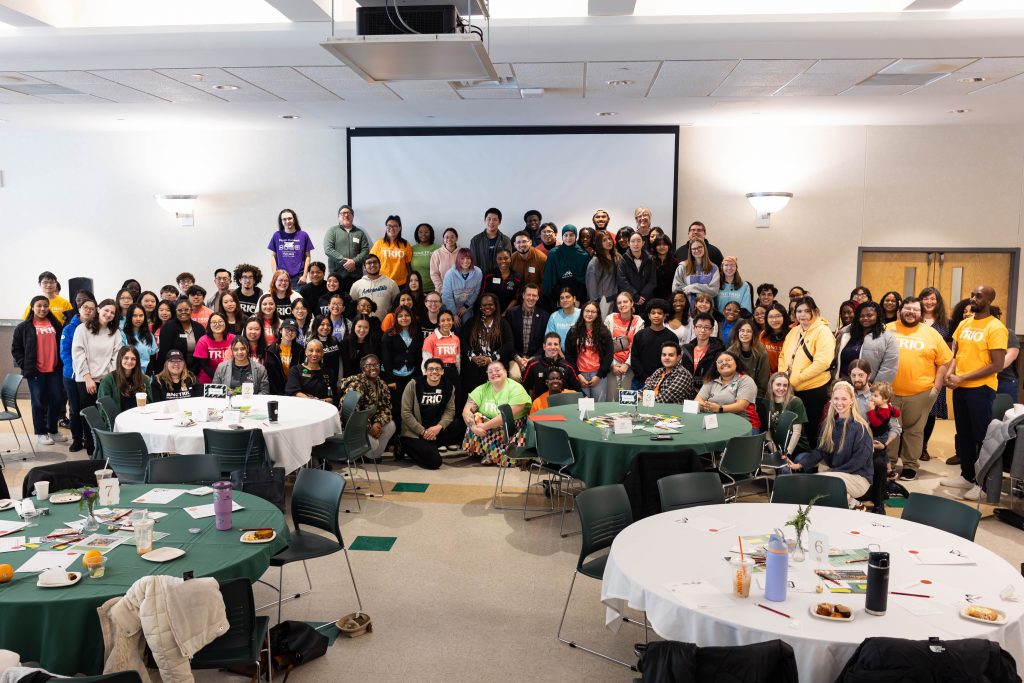TRIO Day was held in Old Union Hall last Saturday to celebrate the 60th anniversary of the University’s TRIO program — among the oldest in the country — designed to help disadvantaged students facing barriers to higher education access. Students, administrators and elected leaders attended the event, with Rep. Josh Riley, State Sen. Lea Webb ‘04 and several students who have benefited from TRIO speaking.
“Above all, we strive to provide a sense of community, even family to our participants,” wrote Steve Rebello, the senior director of Student Support Services and Upward Bound. “While our staff offers professional guidance, we also encourage students to uplift and support one another, creating a network of resilience and success. National TRIO Day is a celebration of that spirit, students overcoming obstacles, achieving their dreams, and proving that TRIO works!”
Federally funded by Title IV of the Higher Education Act of 1965, TRIO has helped students over the past six decades “overcome class, social and cultural barriers to higher education,” the program’s website reads.
Five programs at BU fall under TRIO: Student Support Services, the McNair Scholars Program, Educational Talent Search, Upward Bound and Upward Bound Math-Science. In addition to supporting high school students preparing for college, they assist qualified college students with ongoing academic, professional, financial and personal concerns, including those looking to pursue a graduate degree.
“Since my first year here, the biggest thing [is] community — and that will make or break your college experience,” Arifin Chowdhury, a TRIO mentor and junior majoring in biomedical engineering, told WBNG. “TRIO provided me with that experience, with the family experience, with the help I needed and the support I needed away from home. It’s basically my home away from home.”
TRIO began as three core programs at fewer than 1,000 project sites, expanding over the years to eight programs with approximately 3,000 sites across the United States. More than 875,000 low-income students, ranging from middle school through adult education, participate in TRIO programs, according to the Council for Opportunity in Education.
While making college more affordable, TRIO programs also shorten the time it would otherwise take for disadvantaged students to complete a degree. Compared to non-TRIO peers from similar backgrounds, students enrolled in TRIO programs are 47 percent more likely after four years of college to attain an associate’s degree or transfer to a four-year institution, and after six years of college, 18 percent more likely to earn a bachelor’s degree.
Since TRIO programs are federally funded, President Donald Trump’s recent freeze on all federal grants and loans across the country renders the future funding of TRIO programs uncertain. The removal of such funds could impact students who benefit from the services.
“We are determined as a state to continue fully funding programs like TRIO despite what may happen federally,” Webb told WBNG.
BU was designated a First-Gen Forward Institution in 2021, with 20 to 30 percent of the student population first-generation, many of whom might have been eligible for or participated in TRIO programs.
Building a community network can be crucial for students pursuing higher education, as it allows them to lean on a strong support system during challenging times and ask questions regarding academic and personal growth. An MIT Teaching and Learning Lab study found that a student’s sense of belonging can improve their academic outcomes, increase continuing enrollment and serve as a protective factor for mental health.
“These programs are vital in supporting low-income individuals, first-generation college students, and those with disabilities,” Riley wrote in an Instagram post the day of the celebration. “Together, we can and will empower every student to succeed.”



